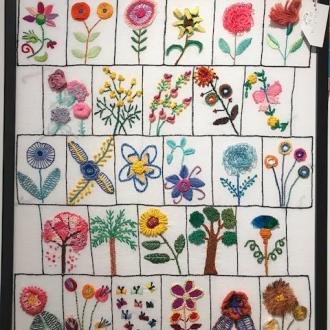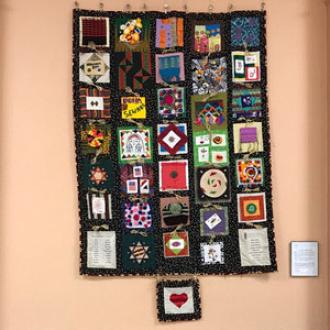
When we interviewed Fadhila Mohammad in summer 2017 in her gracious home in east Worcester, in preparation for writing Path To Empowerment (2017, 28-29), we found that her front room was full of signs of calm, sedate living: several sofas, a wide-screen television set, casual tables, a lovely rug, a glass bowl with two fat goldfish swimming around. This of course stood in great contrast to her Baghdad of memory: the warfare there that had caused her and her engineer husband to flee the country for safety in the U.S. as refugees. Fadhila lost much in her refugee flight: back in Baghdad, she had been a highly credentialed high school science teacher; in resettlement in Worcester, she was studying English, living in subsidized housing, doing embroidery to make a bit of cash. But, she was clearly making the best of things and her embroidery work was exquisite. She remains one of RAW’s most highly skilled and creative makers of stitchery work.
Joan Kariko of RAW started our 2017 interview with Fadhila by showing us a large embroidery stitch sampler panel that Fadhila had made. Using thread in cheery, bright colors, Fadhila had demonstrated a variety of images and stiches. Over the years she has made several of these samplers; as curators of the 2020 Worcester Center for Crafts exhibition called “Crafting a New Home: Refugee Artisans of Worcester,” we featured one of these.
Her stock in trade for RAW, though, are small, approximately 3” by 5 “ linen panels filled with tiny embroidered images. RAW uses these as insets on greeting cards for sale. Fadhila’s greeting card designs are all different one from another. Some buyers love these so much that they do not use them as greeting cards but frame them for display in their homes. Fadhila’s pictorial images include flowers, miniature trees, and nature-inspired shapes.
In our first interview with Fadhila in 2017 Joan Kariko of RAW started our talk by showing us one of the large embroidery ‘sampler’ panels that Fadhila had made. It contained many different images (flowers, plants, abstract line designs) done in diverse embroidery stitches. The thread colors were bright and festive. Clearly Fadhila was celebrating Iraq’s robust embroidery heritages.
Fadhila told us that she learned to embroider as a child from her mother and also in school lessons. She explained that fine embroidery work is an ancient tradition in Iraq for girls and women, a way to demonstrate ancestral traditions as well as personal accomplishment and the maker’s love of beautiful, hand made things. These embroidery traditions long predate all the European and American incursions into the area. In Iraq embroidery has several regional variations: craftswomen from the south tend to use natural world motifs (birds, flowers, trees, so on) while northern Iraq stitchery includes more geometric designs. In her work for RAW Fadhila enjoys drawing on all these local variations.
In making her embroideries Fadhila can think back to more peaceful times in Iraq, she told us. She is proud of the different motif traditions and does her artwork as a means of seeking solace and calm in stressful times. It is notable how very colorful and upbeat her colors choices are when she selects threads to work with. Perhaps she is invoking hope. Fadhila was an enthusiastic participant in our 2020 Worcester Center for Crafts show, “Crafting a New Home.” She is creating colorful and seemingly upbeat art in the midst of great loss.
Items
Vogelsang-Eastwood, Gillian. 2016. Encyclopedia of Embroidery from the Arab World. New York: Bloomsbury.

